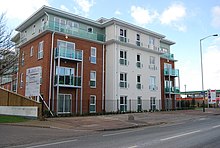Housing association
They are now the United Kingdom's major providers of new housing for rent, while many also run shared ownership schemes to help those who cannot afford to buy a home outright.The 1988 Act redefined housing associations as non-public bodies, permitting access to private finance, which was a strong motivation for transfer as public sector borrowing had been severely constrained.From 2010 to 2012, associations were termed registered providers under the Housing and Regeneration Act 2008, irrespective of status (private, public, for-profit or not-for-profit).In 2004 the British government accepted an EU ruling that considered housing associations as public bodies for the purposes of procurement.Housing associations' day-to-day activities are funded by rent and service charges payments made by, or on behalf of, those living in its properties.In this sense, housing associations are run as commercial entities and the majority do not depend on donations for their general activities.After the Housing Act 1988, the proportion of the cost of new homes met by capital grants was scaled back by the government, so borrowing became the primary source of funding for investment.Much of this was simply borrowed from banks and building societies, but after the 2007–2008 financial crisis, these institutions ceased to offer long-term loans, so developing associations are increasingly turning to corporate bonds to raise funds for expansion.
homeowners' associationnon-profitsocial housingregulated by the statepublic fundingshared ownershipmental healthlearning disabilitiessubstance misusealcoholhomelessyoung peopleex-offendersasylum seekersdomestic violencephilanthropicmiddle classesIndustrial RevolutionGuinness TrustPeabody TrustMetropolitan Association for Improving the Dwellings of the Industrious Classescouncil housingThatchercouncilsClarion Housing GroupSanctuary Housingreal estate investment trustsCivitas Social Housingreal estate investment trustlegal entityindustrial and provident societiestrustscharitiesHousing CorporationHousing and Regeneration Act 2008English High Courtjudicial reviewEnglandHomes and Communities AgencyGreater London AuthorityTenant Services AuthorityNorthern Ireland Housing ExecutiveScottish GovernmentWelsh Governmentlender option borrower optionHousing Act 1988building societies2007–2008 financial crisiscorporate bondsLondon boroughsLandlord and Tenant Act 1985National Housing FederationDecent Homes StandardCouncil housePublic housingArms-length management organisationHousing Action TrustHomeowners associationGOV.UKNewham Recorder